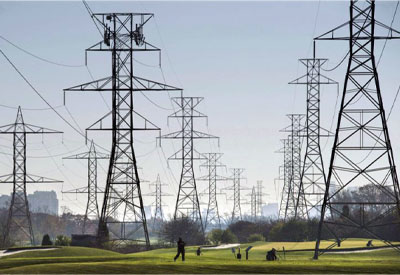High Electrical Costs Drive Manufacturing Jobs Out of Ontario

October 19, 2017
Ontario’s soaring electricity bills have driven numerous factories out of the province according to a new report from the Fraser Institute, leading to a loss of nearly 75,000 manufacturing jobs since the end of the 2008 recession.
Electricity prices in Ontario are now among the highest in North America after years of costly upgrades were made by the province’s government to clean up the electrical system and rebuild an antiquated power grid. The resulting rate hikes have hit the manufacturing sector hard and led to significant job losses that are unlike anything seen in neighbouring jurisdictions as factories have relocated to areas with cheaper power, the right-of-centre think tank said in its report released on Tuesday.
While many of Ontario’s neighbours were able to slowly rebuild their manufacturing after the financial crisis, that didn’t happen in Canada’s most-populous province, where 116,435 manufacturing jobs were lost between 2008 and 2015. The slump has hit the heart of Canada’s economy, as Ontario’s manufacturing sector accounts for almost 40 per cent of the country’s exports.
“During the 2008 recession everybody took a hit, but the other regions were able to get their manufacturing back up. But in Ontario that didn’t happen. Ontario shows unique signs of stress and decline in manufacturing, so we had to look for something unique to Ontario and that’s electricity prices,” said Ross McKitrick, the report’s co-author and an economics professor at the University of Guelph. He said manufacturing has recovered to pre-recession levels in all of Canada’s provinces except for Ontario.
Using existing economic studies, Mr. McKitrick said the report estimated nearly two-thirds of the province’s decline in manufacturing jobs since 2008 was due to elevated electricity prices, equalling about 74,881 jobs. Much of the decline was in energy-intensive industries like the paper sector, iron and steel facilities, and automobile manufacturing.
Ontario’s Green Energy Act has created tens of thousands of jobs according to the provincial government, but the Fraser Institute report found that 1.8 manufacturing positions were lost for every job created in the renewable-energy industry.
While he admits the job-loss figure is large, Mr. McKitrick said it matched the overall size of the drop in manufacturing. “What’s very large is the large increase in electricity prices, that’s what drives the loss,” he said.
Electricity costs for small industrial consumers in the Ottawa-area increased by 50 per cent between 2010 and 2016 according to the study; in Toronto the average increase was 48 per cent. Outside of Ontario the average Canadian increase for industrial consumers was only 15 per cent.
In late 2016, a group of businesses united under the banner of the Coalition of Concerned Manufacturers of Ontario to warn the government that high electricity prices were a real threat that could lead factory owners to look at moving elsewhere.
Economists have warned for some time that Ontario’s high electricity costs could impact competitiveness. In surveys conducted by the Conference Board of Canada, business owners have cited electrical bills as a leading obstacle to investment, according to chief economist Craig Alexander. “The climbing electricity prices have put Ontario manufacturers at an increasing competitive disadvantage,” he said.
Premier Kathleen Wynne announced plans in the spring to cut hydro rates by 25 per cent this year while capping increases to the rate of inflation for the next four years, a move that will save consumers $24-billion. Ontario’s Auditor-General is expected to release a report on Tuesday morning that is critical of that plan, especially the decision to move billions in new debt needed to finance the rebates to a Crown corporation rather than the government’s books.
Story by: Justin Giovannetti
Originally published by The Globe and Mail: https://beta.theglobeandmail.com/news/national/high-electrical-costs-have-driven-thousands-of-manufacturing-jobs-from-ontario-report/article36610740/?ref=http











![Guide to the Canadian Electrical Code, Part 1[i], 26th Edition– A Road Map: Section 56](https://electricalindustry.ca/wp-content/uploads/2022/11/Guide-CE-Code-2.png)



